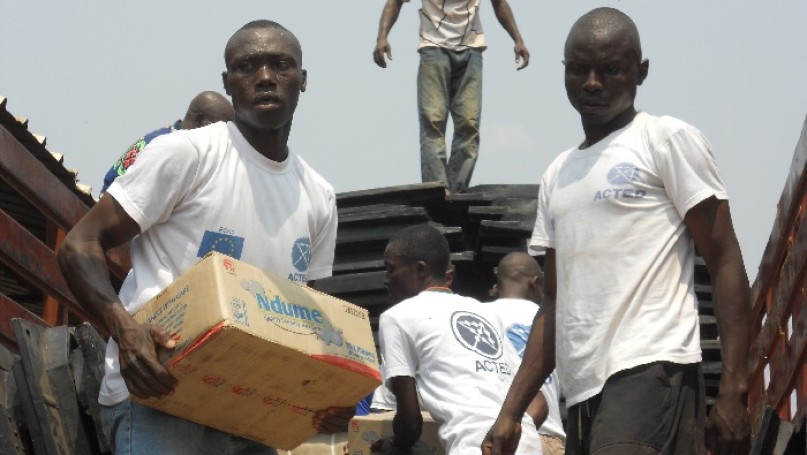
Less than a week before its planned deployment, the future of the EU military mission to the Central African Republic (CAR) is increasingly in jeopardy. In four consecutive force generation conferences held in February and early March, EU member states have been unable to muster the required troops and equipment. Subsequently, in an appeal letter to EU governments dated 11 March, EU High Representative Catherine Ashton warned that the lack of necessary capabilities puts the plans to launch the operation by mid-March at risk, adding that a delay would taint the EU’s credibility.
Initially, the EU responded with unusual speed in authorizing EUFOR RCA Bangui on 20 January; the mission received authorization from the UN Security Council a week later, on 28 January. With a mandate to protect civilians and establish security in a limited area of operation (restricted to the airport in the capital of Bangui, as well as two districts in the city), the EU mission is intended to serve a bridge function, later handing over military control to the UN peacekeeping operation that will replace the current African Union mission in CAR in September. Chapter VII of the UN Charter authorizes the mission to deploy all necessary means to maintain security; indeed, amid the precarious security situation in Bangui, EU troops may very well be required to use force to protect civilians. This puts the CAR mission in direct contrast to the operating theaters of relative stability where EU military training missions have been deployed in the past five years, following its last large-scale military mission in Chad which ended in 2009.
The challenging operating environment in CAR has raised concerns in European capitals about the risks involved, the mission’s necessary capacities, and its duration. Though billed as a mission of a limited duration of six months, some policy makers have expressed concern over the likelihood of a clean handover to a UN mission within that timeframe. France’s recent decision to indefinitely extend its mission in CAR has also likely increased apprehensions about an extended stay for the EU mission, once deployed. Reflecting the scale of the challenges on the ground, the EU force has already been doubled from an initial strength of 500 to 1,000 staff, including 700 troops and police.
At the time of writing, it remains unclear which countries would provide troops for the CAR mission. A proposal from Sweden to deploy the EU’s readily available “battlegroup” was rejected by military officials on the grounds that this force could only be deployed for up to 120 days. Larger EU countries including Germany, the UK, and Italy have ruled out sending troops to CAR. Other EU countries, including Sweden, Finland, Belgium, Poland and several other Eastern European countries, including Estonia, Latvia and non-EU-member Georgia, have considered sending troops. However, the increasingly volatile situation in Crimea now puts commitments from Eastern European countries at risk, as they are likely to want to keep troops close to their home bases.
Meanwhile, the issue of obtaining the necessary logistical support, including vehicles and air transport, is a far greater problem than force generation for the EU CAR mission. As of mid-March, commitments by EU member states only covered 20 percent of the necessary logistical support capacities for the mission. Both the UK and Germany have previously offered crucial air transport capacity, but due to the slow force generation progress for the CAR mission, Germany has postponed the Bundestag meeting on the mandate approving logistical support until 19 March, and it remains unclear if the required support for the mission will be provided any time soon by either of these countries.
In her letter, Ashton warned that a failure to launch the EU mission would have negative effects on force generation efforts for the planned UN peacekeeping operation in CAR. After initial reservations about deploying blue helmets due to the circumstances on the ground, the UN Secretary-General recommended in early March that the Security Council authorize a peacekeeping operation in CAR of nearly 12,000 military and police personnel. This UN mission will also have a significant civilian component that will absorb staff from the existing political mission, the UN Integrated Peacebuilding Office in the CAR (BINUCA). The bulk of the UN force would be made up of the 6,000 African Union troops already in the country, but it would also rely on contributions from member states for the remaining troops, as well as from force enablers. The preparations for the UN peacekeeping mission in CAR come at a time when the UN is already increasing its force contingent in South Sudan by more than 5,000 troops and is struggling to fill force generation gaps in its stabilization mission in Mali – spreading its force generation capacity very thin.
Considering the immense human toll of the conflict in CAR – where thousands have lost their lives and 2.5 million people (over half of the country’s population) are in need of humanitarian assistance – failure on the part of the international community to stem the increasing violence will have devastating consequences. EU member states took the right decision by acting swiftly to approve the military operation in CAR in January. Their hesitation now not only risks the EU’s credibility, but far more importantly, will allow a crisis that that has now taken dangerous ethnic and religious dimensions to deteriorate further and put even more lives in danger.
Further Reading on E-International Relations
- Opinion – The Russia-Ukraine Crisis and Central African Ramifications
- Opinion – The NATO Madrid Summit and the Alliance’s New Dawn
- 10th Anniversary Post – Why E-IR Is Awesome for Us
- The Responsibility to Protect Has Turned into a Strategic Mistake
- Improving the EU Response to Pandemics: Key Lessons from Other Crisis Management Domains
- Legal Responses to the EU Migrant Crisis: Too Little, Too Late?